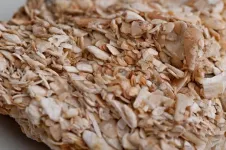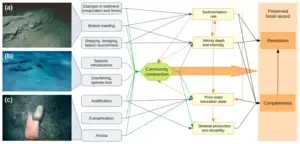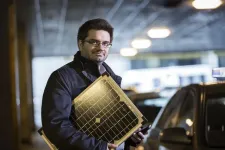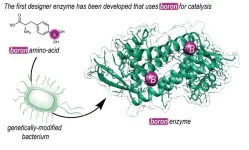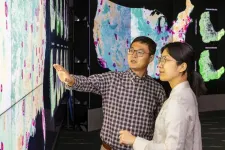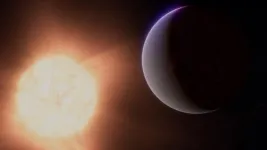(Press-News.org) New research shows human activity is significantly altering the ways in which marine organisms are preserved, with lasting effects that can both improve and impair the fossil record.
“We are not only changing the environment; we’re also changing the nature of the record that archives this information,” said Michal Kowalewski, the Thompson chair of invertebrate paleontology at the Florida Museum of Natural History. “These changes can be both good and bad. On one hand, human activities can prevent the fossil record from preserving useful information about ongoing changes. In other situations, human actions can actually enhance the quality of the currently forming fossil record, thereby providing more information.”
If not properly accounted for, these effects on the fossil record can lead to misinterpretation of data vital for conservation efforts. Humans began altering ecosystems long before they began systematically studying them. In many places, the only way scientists can know what an ecosystem looked like before the arrival of humans is to look back at the recent fossil record.
“We use fossils in conservation to understand the transition from natural, pristine environments to the ones we have today,” Kowalewski said. When scientists know what a degraded ecosystem looked like before it was altered, they know what to aim for when trying to restore it.
Kowalewski and his colleagues specialize in marine paleoecology and co-authored the study with a focus on fossil beds in the world’s oceans. In these environments, the authors say, there are several interconnected factors that influence fossilization, including the rate at which sediment accumulates on the seafloor, the extent to which animals burrow through the sediment, the depth at which remains are buried and how quickly certain fossils disintegrate over time.
All of these factors can and have been influenced by humans. The practice of bottom trawling, in which a net is dragged along the seafloor, mixes and churns sediment, infusing it with oxygen that breaks down organic remains.
On a global scale, bottom trawling is estimated to kick up as much sediment into the water column as is deposited into oceans from all of the world’s rivers.
“I was surprised when working on this study that the impacts of bottom trawling are so widespread,” said lead author Rafal Nawrot, a paleontologist at the University of Vienna. Nawrot studies changes in marine ecosystems that have occurred since the last ice age, a field in which knowing the various factors that help or hinder fossilization is critical.
He recounted one study in which he and colleagues found a distinct lack of large shells from sediment cores drilled into the seafloor. “Given what we now know about the intensity of trawling in some of the areas we were working in, this pattern may just be an artifact of their removal by nets dragged through the seafloor.”
Alterations to the fossil record can be indirect as well. Local extinctions caused by human activity and the introduction of invasive species can both prevent and improve the process of fossilization. The authors give the example of red king crabs (Paralithodes camtschaticus), which were intentionally introduced to the Barents Sea between Russia and Finland in the 1960s. There they had few natural predators, and their population exploded. Red king crabs eat just about anything they can get their claws on and crush the shells of their prey. This caused a steep reduction in the number of burrowing invertebrates, which oxygenate sediments.
Fewer burrowing organisms mean less oxygen in the sediment, which means better preservation. But more shell-crushing crabs means there are fewer shells capable of being preserved. Without the right historical context, future paleontologists trying to sort out this sequence of events may walk away flummoxed.
These and other human-driven changes can be especially difficult to interpret because they mimic natural processes like erosion or species migrations. In some cases, human activity can erase fossil archives entirely or confound research efforts by adding tons of foreign material to an environment.
“Certain processes don’t occur naturally at all, like beach replenishment,” Kowalewski said. When portions of a beach are washed away by hurricanes or rising sea levels, local authorities often pay for ships to haul sediment from deep-water environments — where natural erosion is negligible — to the shoreline, fossils and all.
In other cases, the fossils themselves are the target for relocation.
“Oysters that lived hundreds of thousands of years ago may be removed from one area and added to the modern seafloor of another to facilitate restoration of present-day oyster reefs,” Kowalewski said.
So how do scientists begin to disentangle the various natural and human forces that influence fossilization? It’s complicated, Nawrot said. “It depends on the goal of the study, but there are ways to circumvent these problems.”
One strategy that’s recently become more feasible to implement is radiocarbon dating. Scientists use this method to estimate the age of relatively young fossils, but until recently high costs meant it could only be used sparingly. When analyzing a sediment core drilled in modern seafloors, in which organisms at the top may be thousands of years younger than those at the bottom, researchers would typically select only a few fossils for radiocarbon dating. This provided reliable information but poor resolution, and if the sediment had been unknowingly mixed by bottom trawling, the results could be misleading.
“You wouldn’t be aware of this problem unless you sampled multiple specimens per layer, which isn’t a widespread approach. We think it should be used much more often,” Nawrot said.
Researchers will also need to get more creative with the types of statistical analyses they use to interpret data. These sorts of methods take time to develop and test, but they’re slowly becoming more common, and scientists are inching closer to a better understanding of how humans affect the historical archive of life on Earth.
“Changes in the geological record can be fingerprints of human activity and may themselves reveal something about the history of an ecosystem,” Kowalewski said.
Martin Zuschin of the University of Vienna, Adam Tomašových of the Slovak Academy of Sciences, and Daniele Scarponi of the Università di Bologna are also co-authors of the study.
END
Human activity is making it harder for scientists to interpret oceans’ past
2024-05-08
ELSE PRESS RELEASES FROM THIS DATE:
Department of Energy announces $160 million for research to form microelectronics science research centers
2024-05-08
WASHINGTON, D.C. - Today, the U.S. Department of Energy (DOE) announced $160 million to advance President Biden’s vision to secure the future of American leadership in semiconductor innovation by implementing a key provision in the historic CHIPS and Science Act of 2022 (42 U.S.C. §19331), Microelectronics Research for Energy Innovation. This funding will support the formation of Microelectronics Science Research Centers (MSRCs) focused on energy efficiency and extreme environments.
For ...
Federico Rosei: international recognition for a researcher at the forefront of his field
2024-05-08
INRS professor recognized for international research and mentoring efforts in nanotechnology.
Federico Rosei, a professor at the Institut national de la recherche scientifique (INRS) in materials science and nanotechnology, has been appointed Materials Research Society (MRS) Fellow 2024 for “his leadership in the nanomaterials synthesis and characterization and his sustained international efforts in service, mentoring and outreach in the field.”
He thus becomes the first researcher in Quebec and the third ...
University of Groningen chemists produce new-to-nature enzyme containing boron
2024-05-08
Boronic acid has been used in organic chemistry for decades, even though it is not present in any organism. ‘It gives rise to different chemical reactions than those we find in nature,’ explains Gerard Roelfes, Professor of Biomolecular Chemistry & Catalysis at the University of Groningen. His group created an enzyme with boronic acid at its reactive centre and then used directed evolution to make it more selective and to improve its catalytic power. Furthermore, enzymatic reactions are more sustainable than classical chemical reactions, as they take place at low temperatures and without toxic solvents. The study was presented online in the journal ...
Study led by ORNL informs climate resilience strategies in urban, rural areas
2024-05-08
Local decision-makers looking for ways to reduce the impact of heat waves on their communities have a valuable new capability at their disposal: a new study on vegetation resilience.
Scientists at the Department of Energy’s Oak Ridge National Laboratory completed a study of how well vegetation survived extreme heat events in both urban and rural communities across the country in recent years. The analysis informs pathways for climate mitigation, including ways to reduce the effect of urban heat islands.
Vegetation such as trees provide a valuable cooling effect, shading surfaces and deflecting solar radiation while releasing ...
Save the Date: American College of Surgeons Clinical Congress in San Francisco, October 19-22
2024-05-08
CHICAGO – The American College of Surgeons (ACS) Clinical Congress 2024 will take place Saturday, October 19, through Tuesday, October 22, in San Francisco and will feature opportunities for members of the media to learn about the latest evidence-based practices and research in surgery and healthcare.
This year’s Clinical Congress will once again be a hybrid event, allowing reporters to cover the conference onsite or virtually.
Clinical Congress is one of the world’s largest educational meetings for surgeons, ...
Gerry Rubin receives the 2024 Gruber Neuroscience Prize
2024-05-08
Janelia Senior Group Leader Gerry Rubin and Cori Bargmann of The Rockefeller University have been jointly awarded the 2024 Gruber Neuroscience Prize for their pioneering work in elucidating the organization of neural circuits in behavior and developing new genetic tools to advance the field of neuroscience.
The Gruber Neuroscience Prize, established in 2004, honors scientists for major discoveries that have advanced the understanding of the nervous system. The prize is part of the Gruber International Prize Program, hosted by the Gruber Foundation, which honors individuals in the fields of ...
Pore pressure diffusion led to microseismicity at Illinois basin carbon sequestration site
2024-05-08
Pore pressure diffusion generated by carbon dioxide injected underground at a carbon storage site in the Illinois Basin is the likely cause of hundreds of microearthquakes that took place at the site between 2011 and 2012, according to a new analysis.
The modeling study published in the Bulletin of the Seismological Society of America indicates that pressure diffusion along existing faults into the basement rock could have destabilized the faults where the microseismicity—ranging from Mw -2 to 1—occurred, said Ruben Juanes of MIT and colleagues.
There are some similarities between CO2 injection and wastewater injection from oil and gas operations, although globally the ...
New study finds AI-generated empathy has its limits
2024-05-08
ITHACA, N.Y. – Conversational agents (CAs) such as Alexa and Siri are designed to answer questions, offer suggestions – and even display empathy. However, new research finds they do poorly compared to humans when interpreting and exploring a user’s experience.
CAs are powered by large language models (LLMs) that ingest massive amounts of human-produced data, and thus can be prone to the same biases as the humans from which the information comes.
Researchers from Cornell University, Olin College and Stanford University tested this theory ...
NASA’s Webb hints at possible atmosphere surrounding rocky exoplanet
2024-05-08
Researchers using NASA’s James Webb Space Telescope may have detected atmospheric gases surrounding 55 Cancri e, a hot rocky exoplanet 41 light-years from Earth. This is the best evidence to date for the existence of any rocky planet atmosphere outside our solar system.
Renyu Hu from NASA’s Jet Propulsion Laboratory (JPL) in Pasadena, California, is lead author on a paper published today in Nature. “Webb is pushing the frontiers of exoplanet characterization to rocky planets,” Hu said. “It is truly ...
A tailored vaccine could one day treat eczema in children -- new research
2024-05-08
New research from a multi-disciplinary team at Trinity College Dublin suggests a “tailored vaccine” might hold the key to treating bacteria-driven flares of eczema in children.
The team has taken several leaps forward in understanding how the immune response works in cases of eczema driven by the common, troublesome Staphylococcus aureus bacterium, and in doing so they have identified new cellular targets for a vaccine.
Eczema, also known as atopic dermatitis, affects up to one in four children in Ireland. Common symptoms include itchy, dry skin, and – when bacteria are involved – weeping wounds that can ...
